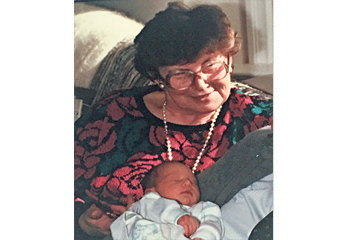“What are you going to be?” the barrage began with the first news of my daughter’s pregnancy.
Hundreds of times by myriad people: “What will you be called?”
I never saw the question as relevant, but others placed great weight on it, as if by refusing to be called something old-fashioned, I could deny my age or denounce my stage of life.
“You look way too young to be a grandmother!”
I cringe at “50 is the new 30” lingo and hate that I love when people tell me how young I look. But it got me thinking: how do I perceive this role – traditional or contemporary? Will I be Bubbie or Grandma?
“What are you going to be?” once opened a question that concluded with “when you grow up.” Becoming a grandmother presumes one is grown up – but I’m still growing. Am I ready to trade in my theatre subscription for pacifiers and pack ’n plays?
On the other hand, as Tevya would say, I always was a thoughtful, analytical mother, prone to guilt and second-guessing. In fact, when I joined a parenting class, my then-school-aged daughter rocked me with her now famous line: “You need to take classes because you don’t know how to be a mother!”
She was absolutely right. Thankfully, my mistakes were benign and she turned out magnificently. Are there things I’d do differently? You bet! And having a grandchild presents the opportunity to do just that – to compensate for choices I regret, things I got wrong, notwithstanding my attendance at Parenting 101.
This baby is a perfect canvas, intelligence shining through his gaze, pre-programmed with all he needs, thank God. We need only support him in a way that suits who he already is. Jacob blessing his grandchildren in Genesis 48 forms the basis for parents’ Friday night blessing of their children. My grandson’s first Shabbat was in the hospital. We lit candles, made Kiddush and a Hamotzi. His parents blessed him. It was very moving and compels me to be a grandmother who lights the way.
READ: THOUGHTS ON GRANDPARENTING
One role in patriarchal Judaism is for a grandfather to be sandek (the one who has the honour of holding the baby) at the brit. With no official role for the grandmother, I created a contemporary one: taking my daughter shopping, baby in tow, for an outfit to wear to the brit.
In my grandson’s first days, my primary pull was to my daughter – worrying about her, caring for her, exceedingly proud of her. Now, that 10-week-old has captured my heart in his own right. I have a dual role: how to ease the way for my children and enrich the life of my grandchild? To step in graciously when parents are juggling and struggling is a win-win situation for three generations. It takes a village. The days of live-in elders are gone, replaced by online support groups for everything from breastfeeding to car seat installation. But nothing can replace the warmth of a hug and the voice of experience.
Case in point was my grandmother. She lived in Israel but spoke Hungarian, becoming “Savta Anyu.” She lost her husband and two sons to the Holocaust, surviving Auschwitz with my mother and aunt, living a legacy of resilience. My favourite childhood memory of her is her cajoling me out of a hiding place where I was sulking. In hindsight, I realize that my parents were time-crunched and tired, whereas she could bring smiles, comforting words, welcoming arms. I carry this mantle.
Modern technology allows grandparents Marci and Rabbi Shalom Schachter to be very involved with their grandchildren who live far away.
“While phones and Skype give us the opportunity to stay in touch… nothing can compare to the physical experience of giving them an ‘aliyah,’ lifting them up with our own hands and giving them an embrace.”
Rabbi Schachter cites the Shema, “veshinantam levanecha,” you shall teach your children. We can apply the words to grandparents’ obligation to teach their grandchildren. Passing on Jewish values to the third generation creates “chazakah,” strength that tradition carries on.
I want to establish lines of communication with my grandson for the inevitable day when he needs advice. Should grandparents be respected as parents according to the fifth commandment? I aim to deserve it.
Wendy Berman’s bubbie was reputedly as wide as she was tall and prone to an accented exclamation of: “Oy, I’m shvitzing – touch me,” an offer, not surprisingly, which tempted nobody. But bubbies are not caricatures. Way before organic baby food, my mother ground homemade chicken and soup for two generations of tiny mouths. It was much more than baby’s first solid food – it represented solid values.
Esther Schwartz brings a modern twist to tradition with “Bubby Granny.” Cheryl Morrison is “Grandma M.” Ruth Abrahamson coined “Glammy Grannies,” but is simply “Gran.” Gail Auerbach’s first grandchild mispronounced “Grandma,” and she remains forever “Nama.” Susanne Alter’s mother was Grandmum; her own moniker is Nana. Daphne Goldberg called her mother “Ima” and her children followed suit.
Grandmotherhood is a great gig. I’ve been preparing for it my whole life, bred to the role by generations of imahot (mothers) before me. There is no official title. What will I be called? Eventually, my grandson will articulate the affection he’s already expressing in smiles and sounds. The question is really: what will he call me? At the right moment, he will dub me. When he finally forms my name with his rosebud lips, I’ll live up to it.
Marilyn Lazar is a Toronto-based writer
